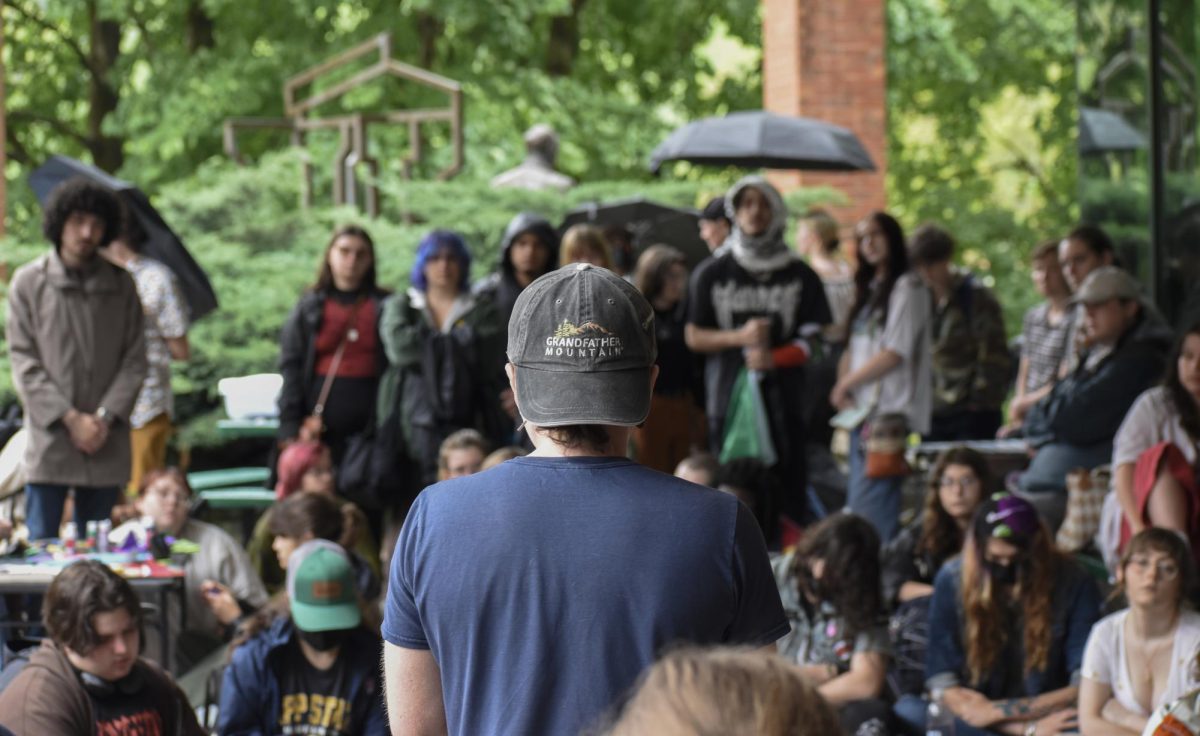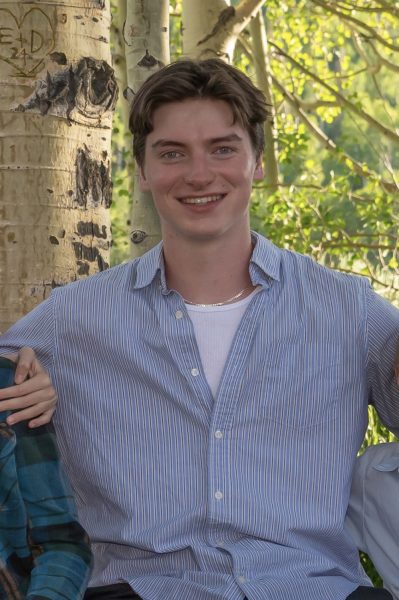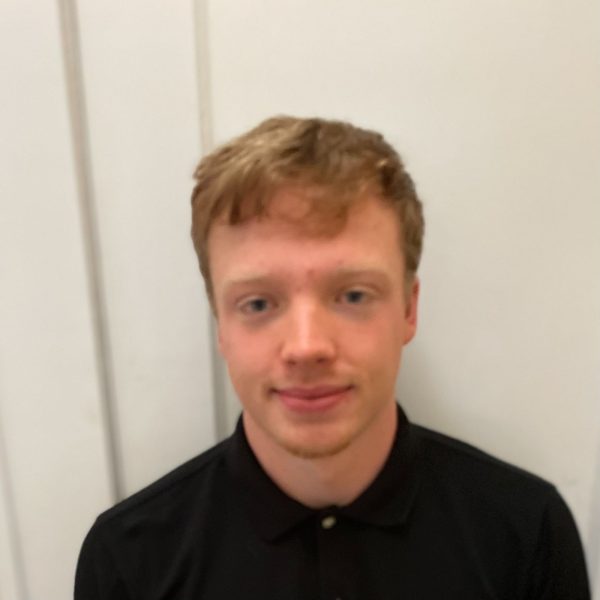Students, faculty and community members held a Palestine solidarity gathering on campus from noon to 8 p.m. Monday and Tuesday, promoting solidarity with recent pro-Palestine student protests and condemning Israel’s military action in Gaza and the West Bank.
During the gathering, attendees marched across campus, held two die-ins and listened to speakers during teach-ins and open-mic sessions.
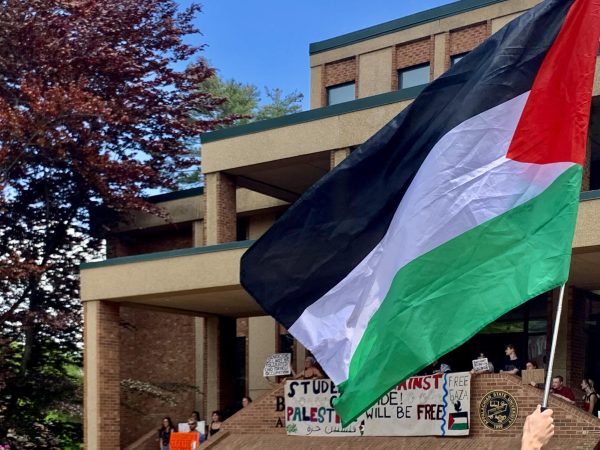
The gathering is the third pro-Palestinian demonstration on campus since the beginning of the latest Israel-Palestine conflict in October. The App State Muslim Student Association held a rally for Palestine on Oct. 25 and assisted community members and students with another rally and march Nov. 12.
The MSA and the High Country Peace & Justice organization, which has organized protests in support of a cease-fire every Sunday since Feb. 2 on the corner of Blowing Rock Road and Highway 105, assisted with organizing the solidarity gathering. The event was not affiliated with any specific groups and “autonomously organized,” according to the event guidelines.
Salma Treish, a senior public health major and member of both organizations, helped organize the gathering and has assisted with pro-Palestine demonstrations in Boone since September. She said she hopes the gathering will educate and bring awareness to the reality of what’s happening to Palestinians.
“People have to know what’s going on in Gaza; it’s been over 200 days,” said Treish, a first-generation Palestinian American.
Before the gathering started, Treish said the group did not plan to construct an encampment similar to those associated with recent pro-Palestinian demonstrations at universities across the country.
“Just as much as we want to bring awareness to the subject, we want people’s safety to be a priority as well,” Treish said.
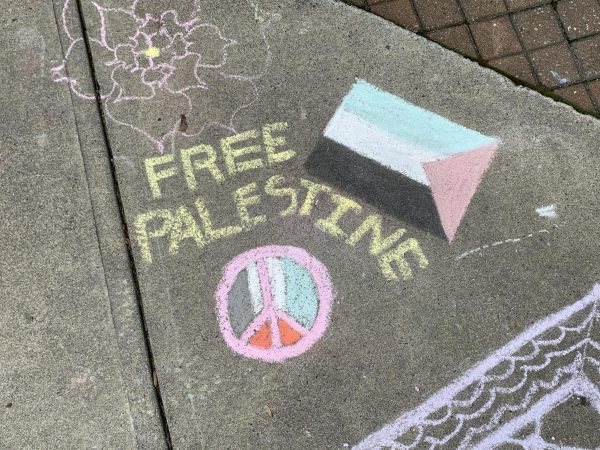
On Friday, Treish and other organizers met with Chief of Police Andy Stephenson and Operations Captain Johnny Brown to dispel any rumors about the possibility of an encampment and discuss safety measures the App State Police could assist with.
“They really showed me that they are here for the students,” Treish said.
On May 1, App State General Counsel revised the Facility Use section of the Policy Manual to prohibit camping or overnight stays in temporary structures without prior approval. The Appalachian contacted General Counsel for comment but did not get a response in time for publication.
Emily Autry, critical crisis communications specialist, said in an email App State Police did not request the revision and that General Counsel regularly consults with campus offices and divisions about potential policy changes.
“It has long been a practice at App State to not allow camping on university property without prior approval, and the policy update codified this long-standing practice,” Autry said in the email.
The gathering was planned to be held on Sanford Mall, but due to rain for the first few hours on Monday, attendees moved a few minutes after the event started under an overhang between the Cascades and Solarium entrances of Plemmons Student Union. The group continued to gather there for the remainder of the event.
On Monday, activities began with a teach-in and open mic session from noon to 5 p.m., during which students and community members shared perspectives on the Israel-Palestine conflict and read Palestinian poetry. As many as 50 people gathered to listen.
“We have Palestinian American students here, we have Jewish students here,” said David Bass, a freshman sustainable development major. “Our main purpose is education and recognition and our main guidelines are peace and love.”
A Palestinian American attendee, who requested to remain anonymous, encouraged the audience to continue advocating for Palestinian liberation even in the face of adversity.
“Spaces like this are so valuable and not everyone has them,” they said. “This is not a small cause, this is not a one-day thing — this has been going on since 1948.”
From 1947-49, over 750,000 Palestinians were displaced and 15,000 killed by Zionist forces during the Nakba, which coincided with the incorporation of the State of Israel in 1948, according to the Institute for Middle East Understanding.
They said the response by many universities to recent pro-Palestinian demonstrations was disappointing and inhibiting to the expression of peaceful protestors.
“It’s really hard to see people counter-protesting a demonstration against a genocide,” they said.
Since April 18, when Columbia University administration authorized NYPD to arrest students participating in the Gaza Solidarity encampment, over 2,700 students have been arrested at U.S. campuses, according to The New York Times.
At the request of the UNC System, five App State Police officers were sent to assist law enforcement at UNC-Chapel Hill on April 30 with the disbandment of a pro-Palestine encampment. App State officers assisted with the arrest of one individual who was not a student, according to an email from Interim Chancellor Heather Norris.
“Our university’s approach to on-campus protests and demonstrations has been to proactively engage with the demonstrators prior to any event, with a goal of balancing safety and free speech,” Norris wrote in the email.
After the speaking concluded, attendees wrote messages on the walkways outside the student union with chalk, such as “Protect Free Speech,” “Disclose Info Related to Endowment” and “Stop Using our Tuition to Fund Genocide.”
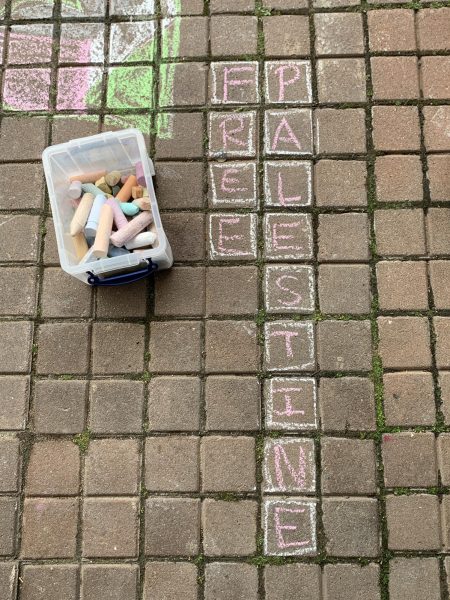
On Tuesday, around 30 attendees marched across campus and held two die-ins: one along the International Hallway of Plemmons Student Union, where attendees held signs detailing Palestine’s history since 3,000 B.C., and another at the B.B. Dougherty Administration Building.
The march began at 2 p.m., with those at the front leading the marchers in call-and-response chants, such as “Gaza, Gaza, don’t you cry, Palestine will never die,” and “Not a conflict, not a war.”
During the march, App State Police officers monitored from a distance in plainclothes.
Both days ended with guided meditation, a candlelight vigil and recitations of more Palestinian poetry.
Organizers outlined goals for the gathering and demands for App State administration and the UNC System, including disclosure of university endowments and divestment from companies donating funds to the Israeli government.
“People pay tuition to attend this institution, so they should be fully aware of where it’s going,” Treish said.
Georgia Wilkes, a junior geography major and president-elect of the MSA, said she hopes the gathering directed attention to what is happening in the Middle East and encouraged people to advocate for divestment from Israel.
“Put yourself in the shoes of people who are facing indiscriminate bombing and think about what would be like if the whole world was turning a blind eye to you,” Wilkes said.
Sitting against a brick column with a Palestinian flag hung above their heads, a group of attendees folded hundreds of origami doves during both days, each dove memorializing the life of a Palestinian child killed since the start of Israel’s attacks on Gaza. The project was started by Callum Conklin, a senior art and geology double major, who handed out doves to the audience during the speaking sessions.
According to the Gaza Health Ministry, at least 34,789 Gazans, including 14,500 children, have been killed during the conflict, with an estimated 8,000 more missing.
“I don’t know if I’ll be able to make that many doves. I know I can’t on my own,” Conklin said to the attendees. “If each of these doves is a child, sit and think with that in your heart and in your hands. Somebody made it.”
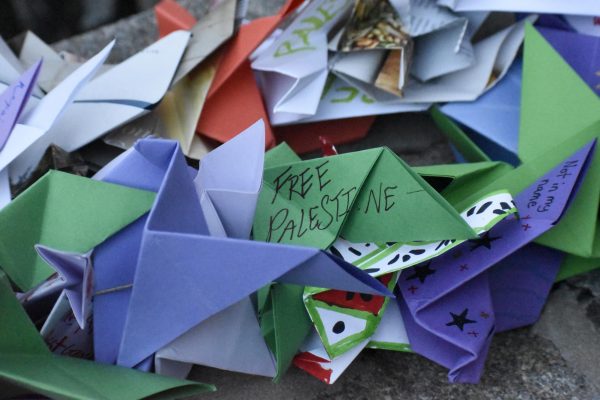
A Palestinian American attendee estimated around 1,000 doves had been made by the end of the event.
At the end of activities Tuesday, Treish encouraged people to attend the Boone Town Council meeting Wednesday, during which the council considered a cease-fire resolution proposed by High Country Peace & Justice.
The council voted 3-2 not to approve the resolution, with members Eric Plaag and Dalton George voting yes and Todd Carter, Edie Tugman and Virginia Roseman voting no.
Treish said every council member is in support of passing a cease-fire resolution, but some members were concerned about the resolution being perceived as antisemitic. The council tasked members Plaag and Tugman to meet with High Country Peace & Justice and the Temple of the High Country to draft a unifying resolution for a cease-fire.
Correction: A previous version of this article had an incorrect link. This has been corrected in the article. Additionally, a sentence about the Boone Town Council’s cease-fire resolution was edited for clarification.

